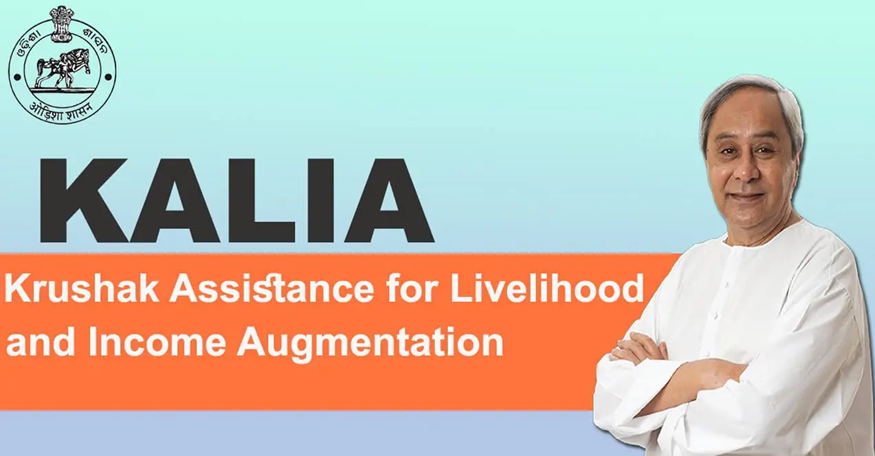Description

Copyright infringement not intended
Context: The Odisha state government has provided funding under the Krushak Assistance for Livelihood and Income Augmentation (KALIA).
Details
- The Odisha state government made funding available under the KALIA initiative. On the occasion of Utkal Divas (1st April), the Chief Minister transferred Rs 877 crore into the accounts of nearly 43 lakh farmers via direct benefit transfer (DBT).
- According to the chief minister, the state not only becomes self-sufficient in food grain production but also contributes significantly to the country's food reserves.
- The CM emphasised crop diversification and stated that the state government has taken numerous initiatives to help the agriculture industry grow. Farm mechanisation and the adoption of contemporary technologies are urgently needed to boost farmers' productivity and revenue.

Krushak Assistance for Livelihood and Income Augmentation (KALIA) Scheme
Objectives
- The KALIA scheme attempts to accelerate agricultural prosperity by financing agricultural operations and compensating producers. Its purpose is to break the cycle of debt for farmers in Odisha by giving financial support to agricultural households, landless labourers, and marginal growers.
- It is seen as a viable alternative to agricultural loan waivers since loan waivers penalise honest farmers who are timely, discouraging them from doing so.
- According to recent news reports, there have been discussions on combining the KALIA plan with the Centre's Pradhan Mantri Kisan Samman Nidhi, also known as the PM-Kisan Yojana. The merger has yet to take place as of now.
Eligibility
- Small and marginal farmers, landless agricultural families, vulnerable agricultural houses, landless agricultural labourers, and sharecroppers (real cultivators) are all eligible under various components of the system.
Provisions under the Scheme
- For Cultivators: Every farmer would receive Rs 10,000 per family as agricultural aid.
- For five agricultural seasons between 2018-19 and 2021-22, each family would get Rs 5,000 in the Kharif and Rabi seasons.
- Agricultural loans are interest-free up to Rs 50,000.
- Agricultural Households without Land: Each landless agricultural household would receive Rs.12500 in financial assistance for agricultural-linked enterprises such as small goat-raising units, mini-layer units, duckery units, fisheries kits for fishermen, mushroom growing, and bee-keeping, among others.
- For the Elderly: The aged, sick, and differently-abled people who are unable to work in agriculture would be given Rs 10,000 per household every year.
- Insurance for farmers and landless agricultural households: The KALIA scheme also comprises a Rs 2 lakh life insurance cover and an extra Rs 2 lakh personal injury coverage for 57 lakh households.

Significance
- KALIA focuses on a wide range of rural activities.
- KALIA scheme helps small-scale farmers, sharecroppers, fishermen, and animal herders who are unable to obtain bank loans and are trapped in debt traps put up by local moneylenders.
- KALIA is seen as a superior alternative to agricultural loan waivers since loan waivers punish and deter honest farmers who repay on time.
Keywords
Utkal Divas
- Odisha Day, also known as Utkala Dibasa, is observed on 1st April in Odisha to commemorate the state's establishment as a separate state from Bihar and Orissa Province on 1st April 1936, with the addition of Koraput District and Ganjam District from the Madras Presidency.
Direct Benefit Transfer (DBT)
- Direct Benefit Transfer (DBT) is an initiative by the Government of India to modify the process for delivering subsidies launched on 1st January 2013. This initiative seeks to develop a Direct system for transferring subsidies directly to people's connected bank accounts.
- Crediting subsidies into bank accounts is supposed to eliminate leakages, duplication, and delay, while the new processes would promote transparency and accountability.
- Beneficiaries were made aware of the significance of opening and maintaining a bank account for DBT to be implemented successfully. Nationwide financial literacy and financial inclusion programmes like the PM's Jan Dhan Yojana, which was inaugurated in August 2014, and the JAM Yojana, which is the bank-mobile-identification trinity, were introduced.
Must Read Articles:
PM-KISAN: https://www.iasgyan.in/daily-current-affairs/prime-ministers-kisan-samman-nidhi-pm-kisan
|
PRACTICE QUESTION
Q. The Pradhan Mantri Kisan Samman Nidhi (PM-KISAN) provides small and marginal farmers with an annual income supplement of Rs 6,000. It intended to increase rural consumption while also assisting impoverished farmers in their recovery from adversity. Analyze the PM-KISAN challenges in this context.
|

https://www.newindianexpress.com/states/odisha/2023/apr/02/odisha-cm-disburses-rs-877-crore-kalia-assistance-to-43-lakh-farmers-in-state-2561927.html















